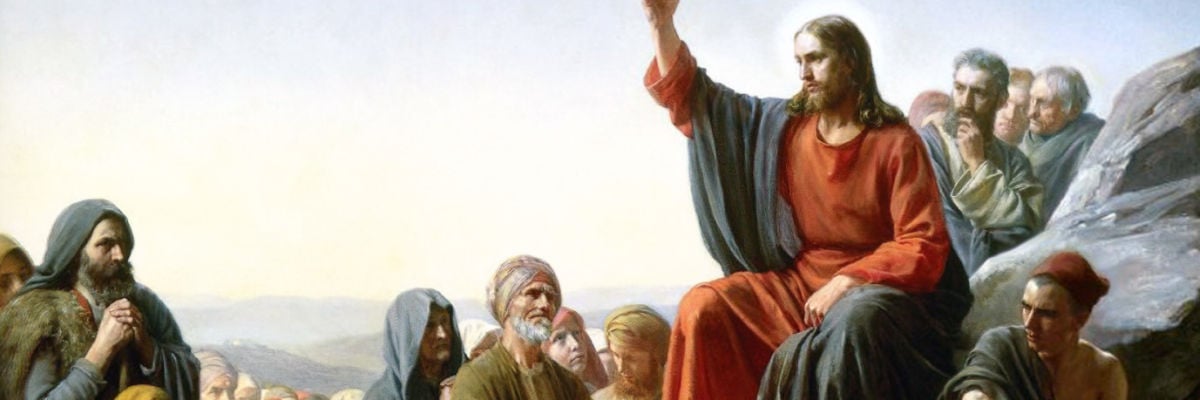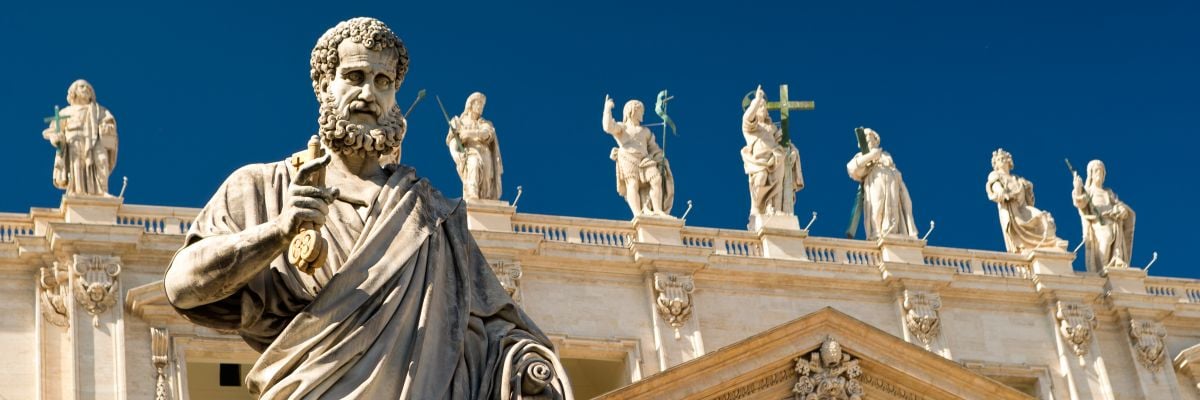But Jesus tells us (and the pope and bishops) what we’re supposed to be teaching:
Matthew 28:19-20 (KJV) 19 Go ye therefore, and teach all nations...20 Teaching them to observe all things whatsoever I have commanded you...
I agree.
BUT: Even though we are all called upon to be a witness and to spread the word and all that, when it comes to doctrinal disputes and the authority to decide between right and wrong doctrine, that falls to the bishops.
That is what the great councils were all about. In fact, the fist council is actually in the Bible, in Acts, the
Council of Jerusalem. Long story short, everyone was arguing about whether or not Christians have to be circumcised. The council, with Peter, among them, decided that Christians do
not need to be baptized. They exercised their authority to "bind and loose", and ever since then, Christians have not needed to be circumcised.
The councils that followed are:
Nicaea I, 325 AD
Pope Sylvester I, 314-335
Emperor Constantine, 306-337
Decisions: Condemned Arianism, which denied the divinity of Christ (elements of Arianism have reappeared in our own time); defined the consubstantiality of the Father and the Son; fixed the date for Easter; began formulation of Nicene-Constantinopolitan Creed.
Constantinople I, 381 AD
Pope Damasus I, 366-384
Emperor Theodosius, 379-395
Decisions: Recondemned Arianism; condemned Macedonianism, which denied the divinity of the Holy Spirit; completed the formulation of the Nicene-Constantinopolitan Creed.
Ephesus, 431 AD
Pope Celestine I, 422-432
Emperor Theodosius II, 408-450
Decisions: Condemned Nestorianism, which denied the unity of the divine and human in Christ; defined that Mary is the Mother of God (Theotokos), a doctrine denied by the Nestorians and by most of today’s Protestants; condemned Pelagianism, which held that man could earn his own salvation through his natural powers.
Chalcedon, 451 AD
Pope Leo the Great, 440-461
Emperor Marcian, 450-457
Decisions: Condemned Monophysitism (also called Eutychianism), which denied Christ’s human nature.
Constantinople II, 553 AD
Pope Vigilius, 537-555
Emperor Justinian I, 527-565
Decisions: Condemned the Three Chapters, writings tainted by Nestorianism and composed by Theodore of Mopsuestia, Theodoret of Cyr, and Ibas of Edessa.
Constantinople III, 680 AD
Pope Agatho, 678-681
Emperor Constantine IV, 668-685
Decisions: Condemned Monothelitism, which held Christ had but one will, the divine (this heresy arose as a reaction to the monophysite heresy); censured Pope Honorius I for a letter in which he made an ambiguous but not infallible statement about the unity of operations in Christ (an episode commonly used by anti-Catholic writers as an argument against papal infallibility, but for the real meaning, see Catholicism and Fundamentalism, pages 227-229).
Nicaea II, 787 AD
Pope Hadrian I, 772-795
Emperor Constantine VI, 780-797
Decisions: Condemned iconoclasm (which was mainly confined to the East), a heresy that held that the use of images constituted idolatry; condemned Adoptionism, which held that Christ was not the Son of God by nature but only by adoption, thereby denying the hypostatic union.
Constantinople IV, 869 AD
Pope Hadrian II, 867-872
Emperor Basil, 867-886
Decisions: Recondemned Adoptionism; deposed Photius as patriarch of Constantinople, thereby ending the Photian Schism, but this did not completely remove disaffections between the West and the East (in 1054 came the final break, when the Eastern Orthodox Churches broke away from unity with Rome).
Lateran I, 1123 AD
Pope Callistus II, 1119-1124
Emperor Henry V, 1105-1125
Decisions: Confirmed the Concordat of Worms (1122), in which the Pope and Emperor sought to end the dispute over investiture (the attempt by the secular powers to assume authority in appointing bishops; this was a main source of Church/state friction during the Middle Ages).
Lateran II, 1139 AD
Pope Innocent II, 1130-1143
Emperor Conrad III, 1138-1152
Decisions: Ended a papal schism by antipope Anacletus II; reaffirmed baptism of infants; reaffirmed the sacramental nature of the priesthood, marriage, and the Eucharist against Medieval heretics; decreed that holy orders is an impediment to marriage, making the attempted marriage of a priest invalid.
Lateran III, 1179 AD
Pope Alexander III, 1159-1181
Emperor Frederick Barbarossa, 1152-1190
Decisions: Regulated papal elections by requiring a two-thirds vote of the cardinals (see in this issue the article by Canon Francis J. Ripley, page 27); condemned Waldensianism and Albigensianism, a form of Manichaeanism (an ancient heresy that held that matter is evil; Albigensians opposed the authority of the state and of the Church, opposed the sacrament of matrimony, and practiced ritual suicide; despite these tenets, many anti-Catholics believe Albigensianism was the continuation of “real Christianity” during the Middle Ages and was a forerunner of Protestantism).
Lateran IV, 1215 AD
Pope Innocent III, 1198-1216
Emperor Otto IV, 1209-1215
Decisions: Ordered annual reception of penance and the Eucharist; used the term “transubstantiation” to explain the Real Presence of Christ in the Eucharist; adopted further canons against the Albigensians.
Lyons I, 1245 AD
Pope Innocent IV, 1243-1254
Emperor Frederick II, 1220-1250
Decisions: Excommunicated and deposed Frederick II for heresy and crimes against the Church.
Lyons II, 1274 AD
Pope Gregory X, 1271-1276
Emperor Rudolf I, 1273-1291
Decisions: Effected only temporary union of the Eastern Churches with the Roman Church; promulgated regulations for conclaves.
Vienne, 1311 AD
Pope Clement V, 1305-1314
Emperor Henry VII, 1308-1313
Decisions: Suppressed the Knights Templars; issued decrees on the reform of morals.
Constance, 1414 AD
Popes Gregory XII, 1406-1415
Emperor Sigismund, 1410-1437
Decisions: Ended the Great Schism, which involved three rival claimants to the papacy (see in this issue the article by Canon Francis J. Ripley, page 27); opposed the teachings of John Wycliffe, who taught sola scriptura, denied the authority of the pope and bishops, denied the Real Presence of Christ in the Eucharist, and wrote against penance and indulgences; condemned as a heretic John Huss, who denied papal authority and taught wrongly about the nature of the Church and who was burned at the stake in 1415 (in 1457 his followers established what became known commonly as the Moravian Church, which was the first independent Protestant church).
Florence, 1438-1443 AD
Pope Eugene IV, 1431-1447
Emperors: Albert II, 1438-1439
Frederick III, 1440-1493
Decisions: Reaffirmed papal primacy against claims of conciliarists that an ecumenical council is superior to a pope; approved reunion with several Eastern Churches, but the reunion was only temporary.
Lateran V, 1512-1517 AD
Popes Julius II, 1503-1513
Leo X, 1513-1521
Emperor Maximilian I, 1493-1519
Decisions: Opposed erroneous teachings about the soul; reaffirmed the doctrine of indulgences; restated the relationship between popes and ecumenical councils; on the eve of the Protestant Reformation, failed to inaugurate an authentic and thoroughgoing reform of the Church, inadvertently helping Protestantism.
Trent, 1545-1549, 1551-1552, 1562-1563 AD
Popes Paul III, 1534-1549
Julius III, 1550-1555
Pius IV, 1559-1565
Emperors Charles V, 1519-1558
Ferdinand I, 1558-1564
Decisions: Affirmed Catholic doctrines against the errors of the Protestant Reformers; reaffirmed teachings on the role of the Bible and Tradition, grace, sin, justification by faith (but not by “faith alone”), the Mass as a real sacrifice, purgatory, indulgences, jurisdiction of the pope; initiated the Counter-Reformation; reformed the clergy and morals; promoted religious instruction; ordered the establishment of seminaries for the future training of priests.
Vatican I, 1869-1870 AD
Pope Pius IX, 1846-1878
Decisions: Defined papal infallibility and primacy; condemned errors regarding the relationship between faith and reason (the council was cut short by war, its work to be taken up again by Vatican II).
Vatican II, 1962-1965 AD
Popes John XXIII, 1958-1963
Paul VI, 1963-1978
Decisions: Issued pastoral documents on the renewal and reform of the Church, intending the make the Church more effective in dealing with the contemporary world.


